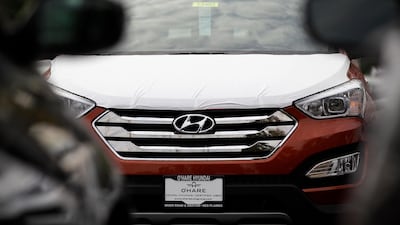The National Highway Traffic Safety Administration (NHSTA) is investigating some 3 million US vehicles made by Hyundai and Kia, following thousands of complaints that the cars went up in flames even without being involved in a crash.
The NHTSA tallied more than 3,000 complaints about the Hyundai and Kia vehicles that drivers lodged with the agency or the manufacturer, according to memos disclosing the new investigations on the agency's website. The complaints allege a total of 103 injuries and one fatality, according to the memos.
Hyundai is co-operating with NHTSA’s inquiries and has “provided the agency with comprehensive data on the issue”, the car company said. Kia said it will continue to work with the agency in a “full and transparent manner”.
The investigations cover nearly 1.7 million 2011-2014 Kia Optima and Sorento models and the 2010-2015 Kia Soul, plus about 1.3 million Hyundai Sonata and Santa Fe models from model years 2011-2014.
While Hyundai and Kia compete separately in car markets, they are closely linked as part of a South Korean vehicle and auto parts conglomerate and their models often share common chassis, engine and other technologies. The companies have some overlapping ownership.
Shares of Hyundai fell as much as 2.5 per cent in Seoul on Tuesday, while Kia dropped as much as 1.1 per cent. South Korea’s benchmark Kospi index rose 0.2 per cent.
Hyundai and Kia have launched several recalls to address potential engine stalls and fires in some of the vehicles now under investigation, according to Bloomberg. The new inquiries will evaluate the frequency and risks posed by the alleged flaw in the affected vehicles more broadly, according to the agency.
The car manufacturers might end up facing sizeable claims from vehicle owners, according to Esther Yim, an auto analyst at Samsung Securities in Seoul.
“Complaints are filed constantly and it’s not likely to end unless there’s compensation for consumers,” Ms Yim said. “The amount might not be small.”
Hyundai and Kia came under the scanner by US investigators after a whistle-blower reported to NHTSA in 2016 alleged manufacturing defects in engines, prompting the regulator to open inquiries on the timeliness and scope of recalls. In February, South Korean prosecutors searched the quality centre of Hyundai Motor over suspicion that it concealed manufacturing flaws, according to Yonhap News.
The Centre for Auto Safety, an advocacy group in Washington, asked NHTSA to investigate the risk of vehicle fires in several Hyundai and Kia models in 2018.
“Hopefully, this step will quickly lead to a recall being issued as soon as possible,” said Jason Levine, the Centre for Auto Safety’s executive director. “The reality is that extended investigations do not protect Kia and Hyundai owners; that requires recalls which result in effective repairs.”
In January, the car companies agreed to offer software upgrades for 3.7 million vehicles not being recalled, Reuters reported.

